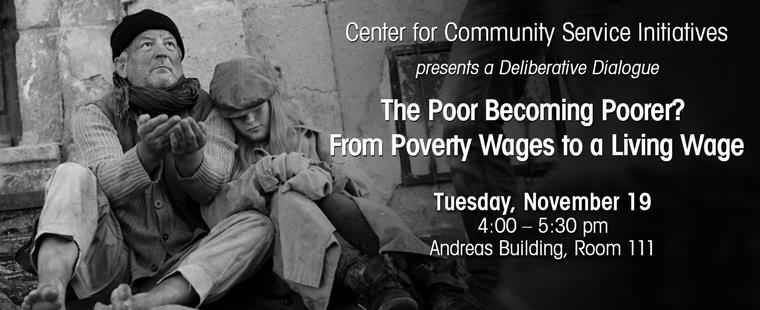Tuesday, November 19
4:00-5:30 PM
Andreas 111
The gap between the wealthy and the poor in the United States continues to grow. One proposed solution is the implementation of a living wage. A living wage is the minimum income necessary for a worker to meet their basic needs. However, opponents to the living wage argue that implementing a living wage would have a negative impact on businesses and other parts of the economy.
Is the Living Wage the solution to ending poverty? Join us for a lively public dialogue on this important issue.
Sponsored by the Center for Community Service Initiatives and the Campus Democracy Project Organizing Committee
The income gap between the rich and the poor is the widest in recorded history. One proposed solution to alleviating poverty is the implementation of a living wage, the minimum income needed for an individual to have their basic needs met. Opponents to the living wage argue that a living wage will have adverse effects on businesses and the economy.
Is a living wage a solution to ending poverty? Come participate in this important discussion.
Confirmed panelists:
Dr. Victor Romano, Professor of Criminology and Sociology, Barry University
Jeanette Smith, Executive Director, South Florida Interfaith Workers
Moderator, Dr. Laura Finley, Professor of Criminology and Sociology, Barry University
This event is part of the Deliberative Dialogue series, moderated discussions for working towards a common understanding of social issues, identifying practical solutions, and promoting workable public policy.
Free and open to the public
Refreshments will be provided
For more information, contact the Center for Community Service Initiatives atservice@barry.edu, 305-899-3696 or visit our website atwww.barry.edu/service.

